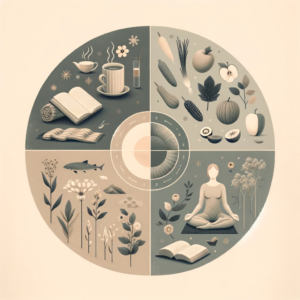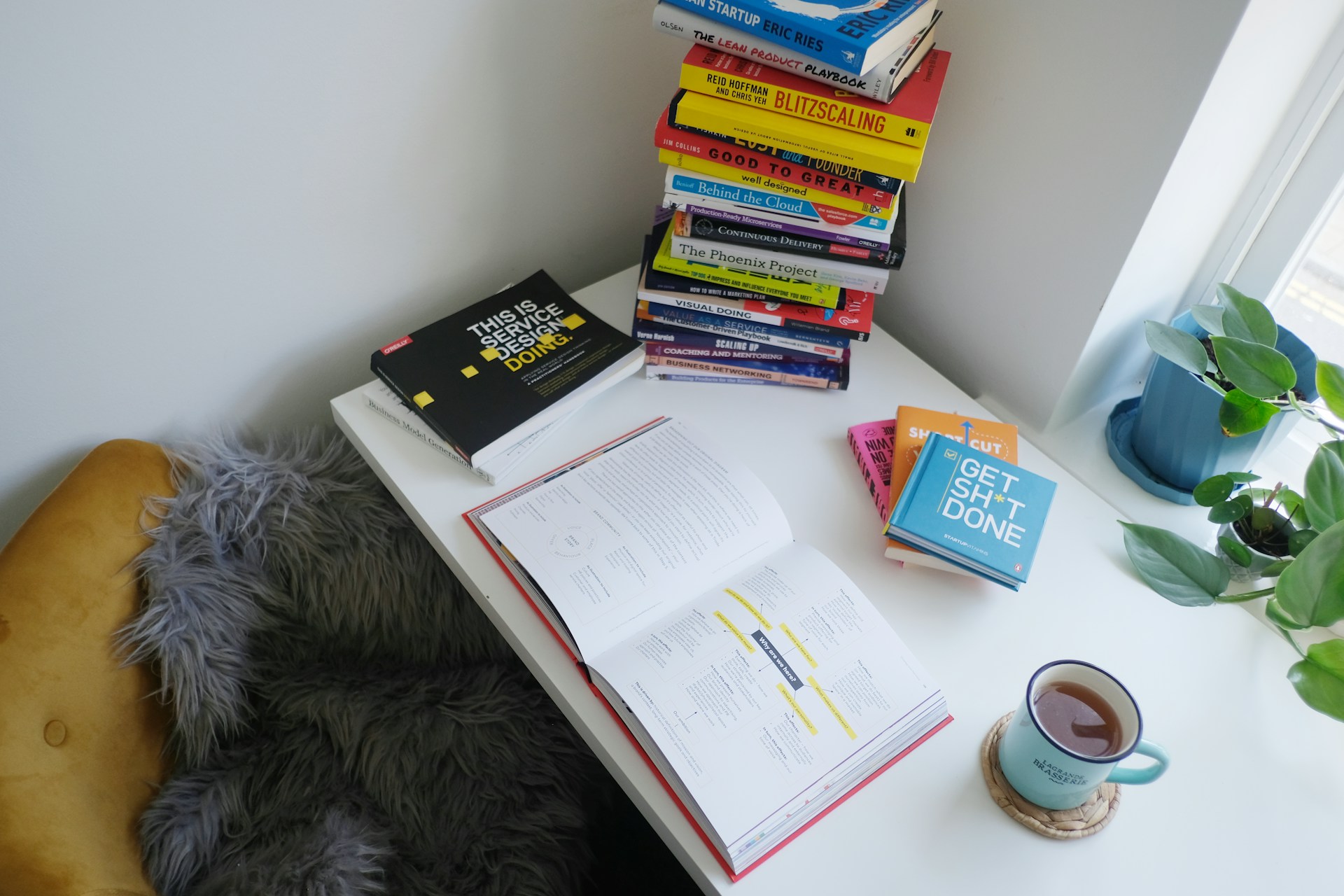In the hustle and bustle of our daily lives, it’s easy to lose sight of the intrinsic connection between our wellbeing and the natural cycles that surround us. Holistic health isn’t just about the absence of illness; it’s about thriving physically, mentally, spiritually, and socially.
As the Wheel of the Year turns, marking the passage of seasons, it offers a natural rhythm to align our health practices. This article delves into the essence of nurturing your body and soul in harmony with these cycles, setting the foundation for a vibrant and balanced life.
Mind-Body Connection
The intricate dance between the mind and the body is a central pillar of holistic health. When our thoughts are clouded with stress or negativity, our bodies often manifest these as physical symptoms.
Conversely, when we suffer from physical ailments, our mental state can take a hit. By engaging in mindfulness practices, such as meditation or deep-breathing exercises, we can foster a stronger, more resilient connection.
Daily mental exercises, even as simple as journaling gratitude or practicing positive affirmations, can steer our thoughts towards a healthier mindset.
Mindfulness and Mental Clarity Practices
Mindfulness can transform the mundane into the meaningful. Engaging in daily practices like focused breathing or mindful walking can sharpen mental clarity and ground our thoughts in the present moment.
These practices don’t require hours of dedication; even a few minutes a day can yield significant benefits. Setting aside time for reflection can also cultivate a more profound sense of self-awareness and inner peace.
Daily Mental Exercises
Mental exercises are the calisthenics of the mind. They can range from solving puzzles to engaging in creative endeavors like painting or writing.
These activities keep the mind agile and can improve memory, concentration, and problem-solving skills. Allocating a small portion of your day to mental stimulation can lead to lasting cognitive benefits and contribute to overall wellbeing.
Physical Nourishment
Our bodies are our temples, and what we put into them can be our most powerful form of medicine or our slowest form of poison. The shift in seasons provides a cue to vary our diet, incorporating seasonal fruits and vegetables that are at their nutritional peak.
Eating a rainbow of foods not only pleases the palate but also ensures a wide range of vitamins and minerals that support bodily functions, from immune response to energy levels.
Importance of Seasonal Whole Foods
Each season brings its bounty, offering foods that are naturally designed to support our health during that time. Summer’s berries and leafy greens, autumn’s root vegetables, winter’s hearty squashes, and spring’s tender shoots — each provide unique nutritional profiles that align with our body’s seasonal needs.
Eating seasonally also supports local farming communities and reduces the environmental impact associated with transporting food long distances.
Balancing Diet with the Change of Seasons
As the seasons change, so too can our dietary needs. The cooler months might call for more warming, energy-dense foods, while the warmer months invite lighter, hydrating fare. Listening to our bodies and adjusting our eating habits accordingly can help maintain balance and wellbeing throughout the year.
Hydration and Bodily Functions
Hydration is a cornerstone of health, yet often overlooked. Water is vital for every cell in our body, facilitating processes from digestion to detoxification.
Ensuring adequate hydration can enhance cognitive function, skin health, and overall vitality. The amount of water needed can vary based on individual factors and environmental conditions, but aiming for around eight glasses a day is a good rule of thumb.
Exercise and Physical Activity
Physical activity is a non-negotiable aspect of a healthy lifestyle. It’s not just about hitting the gym; it’s about finding joy in movement. Regular exercise boosts mood, improves sleep, and reduces the risk of chronic diseases.
But as the Wheel turns and seasons change, our activity levels can fluctuate. It’s important to adapt our routines to the weather and our energy levels, ensuring consistency in our fitness journey.
Different Forms of Exercise
There’s an exercise for every season and reason. Winter might call for indoor yoga or pilates, while summer beckons us outdoors for swimming or cycling. Strength training, cardio, flexibility, and balance exercises all play unique roles in maintaining a well-rounded fitness regimen.
The key is to find activities that are enjoyable and sustainable, so exercise becomes a part of daily life rather than a chore.
Adapting Physical Activity to the Seasons
Our ancestors lived in tune with the natural cycles, and though modern life has us indoors much of the time, we can still heed nature’s cues. In warmer months, early morning or late evening workouts can beat the heat, while colder months might mean more indoor activities.
Seasonal sports and outdoor chores like gardening or snow shoveling can also be great ways to stay active while connecting with the rhythms of nature.
Short, Effective Workouts
Time constraints shouldn’t be a barrier to exercise. Short, high-intensity interval training (HIIT) sessions can fit into a lunch break and offer substantial health benefits. Likewise, integrating activity into daily routines — like taking the stairs or a walking meeting — can make exercise part of the daily flow, rather than another task on the to-do list.
Rest and Sleep
Equally as critical as the food we eat and the exercise we undertake is the rest we allow ourselves. Sleep is the golden chain that ties our health and bodies together. It’s during these precious hours of slumber that our bodies repair, our hormones balance, and our memories consolidate.
The changing of the seasons can influence our sleep patterns, and it’s important to respect these natural rhythms by creating a restful environment and a consistent bedtime routine.
The Role of Rest in Holistic Health
Rest isn’t just about sleep; it’s also about moments of stillness throughout our day. These pauses are opportunities for our bodies to recharge, reduce stress, and improve alertness. In our fast-paced world, it’s essential to schedule time to unwind. A short afternoon break or a quiet evening ritual can help reset our nervous system and promote a sense of calm.
Improving Sleep Quality with the Seasons
As daylight hours wax and wane, our sleep requirements may shift. The long nights of winter might call for an earlier bedtime, while summer’s early dawns can encourage an earlier rise.
To improve sleep quality, consider blackout curtains to keep your bedroom dark or use a sleep mask. Maintaining a cool, comfortable bedroom temperature and a consistent sleep-wake schedule also supports better sleep.
Impact of Sleep on Physical and Mental Health
Quality sleep is foundational for cognitive function, emotional balance, and physical health. It affects everything from our mood and energy levels to our weight and immune system. Chronic sleep deprivation can have serious health implications, so prioritizing sleep is a non-negotiable aspect of holistic wellbeing.
Spiritual Wellness
Spiritual wellness may be an intangible element of health, but its effects are palpable. It involves a deeper connection with oneself, others, and, for some, the greater universe.
As the Wheel of the Year turns, it offers natural milestones to reflect, reset, and renew our spiritual intentions. Whether it’s through meditation, nature walks, or other practices, nurturing our spiritual self is vital for holistic health.
Various Forms of Spiritual Practice
Spirituality can take many forms, from organized religion to personal reflection. It’s about finding meaning and purpose in life, which can be cultivated through practices like yoga, meditation, or spending time in nature.
Even simple acts like watching the sunrise or setting intentions with the new moon can be powerful spiritual experiences that enhance wellbeing.
Connection with Nature and Spiritual Health
Aligning with the natural world can be a profound spiritual practice. Observing the cycles of the earth, the phases of the moon, and the changing seasons can help us feel a sense of belonging and interconnectedness. These natural rhythms remind us that we’re part of something larger and can help us find harmony in our own lives.
Daily Spiritual Exercises
Incorporating spiritual exercises into our daily routine doesn’t have to be time-consuming or complex. It can be as simple as setting aside time for quiet contemplation, practicing gratitude, or engaging in acts of kindness. These practices ground us, provide perspective, and contribute to a sense of peace and contentment.
Emotional Balance
Emotions are the language of our inner world, communicating our needs, desires, and boundaries. Holistic health recognizes the importance of emotional expression and regulation as a vital component of overall wellbeing.
As we journey through the seasons, our emotional landscape can shift, requiring us to stay attuned and responsive to our changing inner climate.
Managing Stress and Emotional Health
Stress is an inevitable part of life, but it’s our response to it that matters. Techniques like deep breathing, mindfulness, and exercise can be effective ways to manage stress levels. Establishing a routine that includes these practices can provide stability and resilience against the ebb and flow of life’s stressors.
Emotional Expression and Release
Suppressing emotions can lead to physical and mental health issues. It’s essential to find healthy outlets for emotional expression, such as talking with a trusted friend, journaling, or creative activities. Allowing ourselves to feel and express our emotions can lead to a more balanced and fulfilling life.
Techniques for Emotional Grounding
Emotional grounding techniques, such as visualization, meditation, or even simple tactile exercises like holding a stone, can help to center our emotions, especially during times of change. These practices can provide a sense of stability when we might feel overwhelmed or disconnected.
Social Connections
Humans are inherently social beings, and our connections with others play a crucial role in our holistic health. Our relationships can provide support, joy, and a sense of belonging.
Balancing these relationships with our personal wellness needs can be a delicate dance, particularly as we navigate the varying energy levels that come with the changing seasons.
Contributing to Holistic Health
Our social interactions can either be sources of stress or wellsprings of joy. Cultivating positive relationships and setting boundaries with those that drain us is crucial. Engaging in community activities, volunteering, or simply spending time with loved ones can bolster our emotional health and provide a support network.
Finding Community and Building Supportive Networks
Community can be found in many places, from workout classes to book clubs, to online forums. These networks offer not just companionship but also collective wisdom and shared experiences. They can be particularly beneficial during times of personal growth or change, providing encouragement and support.
Balancing Social Life with Personal Wellness
While social connections are important, it’s equally vital to ensure personal space for self-care and reflection. Learning to say no to social engagements when needed and prioritizing self-care activities can help maintain this balance, ensuring that our social lives enrich rather than deplete our wellbeing.

Embracing holistic health is about more than just treating symptoms; it’s about nurturing all aspects of ourselves in alignment with the natural world. As we transition through the seasons, let the Wheel of the Year be a guide to living a life that is rich, balanced, and full of vitality.
Start where you are, use what you have, and do what you can to invest in your wellbeing today for a healthier tomorrow.
















